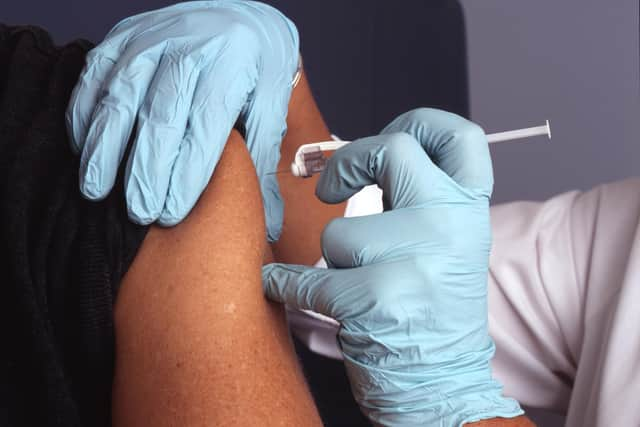What Lancashire residents should do if they have an underlying health condition and think they should be prioritised for Covid vaccine
and live on Freeview channel 276
The issue was raised at a recent Lancashire County Council meeting where there was a call for patients suffering from ME or chronic fatigue syndrome (CFS) to be included in group 6 on the vaccine priority list.
That cohort of patients, aged between 16 and 64, are those considered to be in a “clinical risk group”. They are currently being vaccinated in the latest phase of the rollout, ahead of the general 60-64-year-old population and the remaining younger age groups yet to come.


Advertisement
Hide AdAdvertisement
Hide AdThe priority order for vaccines was drawn up by the independent Joint Committee on Vaccination and Immunisation (JCVI), which also published a list of conditions that would put someone at high clinical risk should they contract Covid-19. It includes diagnoses that would classify them as having chronic respiratory, heart, kidney, liver or neurological disease.
The County Hall meeting heard that while the JCVI had not included ME or CFS in its examples of conditions for vaccine priority, the committee had recently stressed that their list was not “exhaustive”.
Cabinet member for health and wellbeing Shaun Turner, said: “The JCVI has emphasised that...GPs should - not can - apply their clinical judgement when it comes to patients who have underlying health conditions that are likely to be exacerbated by Covid-19 infection.
“This means that doctors cannot simply state that they are unable to place someone with ME or chronic fatigue syndrome into group 6 because the JCVI does not allow them to do so.
Advertisement
Hide AdAdvertisement
Hide Ad“They should be applying their clinical judgement in this situation and taking each circumstance into account.”
Pressed by County Cllr Gina Dowding, who asked the original question, on whether he would continue to push for “fairness for people who are overlooked”, County Cllr Turner revealed that he was regularly contacted by residents regarding vaccine priority.
“Clearly, it’s a clinical decision and...I’ll continue to lobby that GPs use their clinical judgement - that they have been told by the JCVI that they can use - and continue to look at all groups and consider them on a clinical level,” he added.
The Local Democracy Reporting Service (LDRS) approached the NHS in Lancashire about the issue and a spokesperson said: “The NHS is currently vaccinating people in the top seven priority groups identified by the JCVI, which includes individuals who are on the Shielded Patient List and who are at high risk from coronavirus.
Advertisement
Hide AdAdvertisement
Hide Ad“If you think that you are vulnerable and should be on the list, please contact your GP surgery.”
The LDRS understands that GPs across Lancashire are currently receiving high volumes of calls.
The JCVI has prioritised vaccine rollout largely on the basis of age, except for care home residents, frontline health and care workers, the clinically extremely vulnerable or those at clinical risk.
Those considered “extremely clinically vulnerable” - and who have been advised to shield - were vaccinated as part of the first four cohorts who received a jab prior to 15th February.
Advertisement
Hide AdAdvertisement
Hide AdThe JCVI guidance accompanying its list of clinical risk groups states: "The examples...are not exhaustive, and, within these groups, the prescriber should apply clinical judgement to take into account the risk of COVID-19 exacerbating any underlying disease that a patient may have, as well as the risk of serious illness from COVID-19 itself."
Comment Guidelines
National World encourages reader discussion on our stories. User feedback, insights and back-and-forth exchanges add a rich layer of context to reporting. Please review our Community Guidelines before commenting.